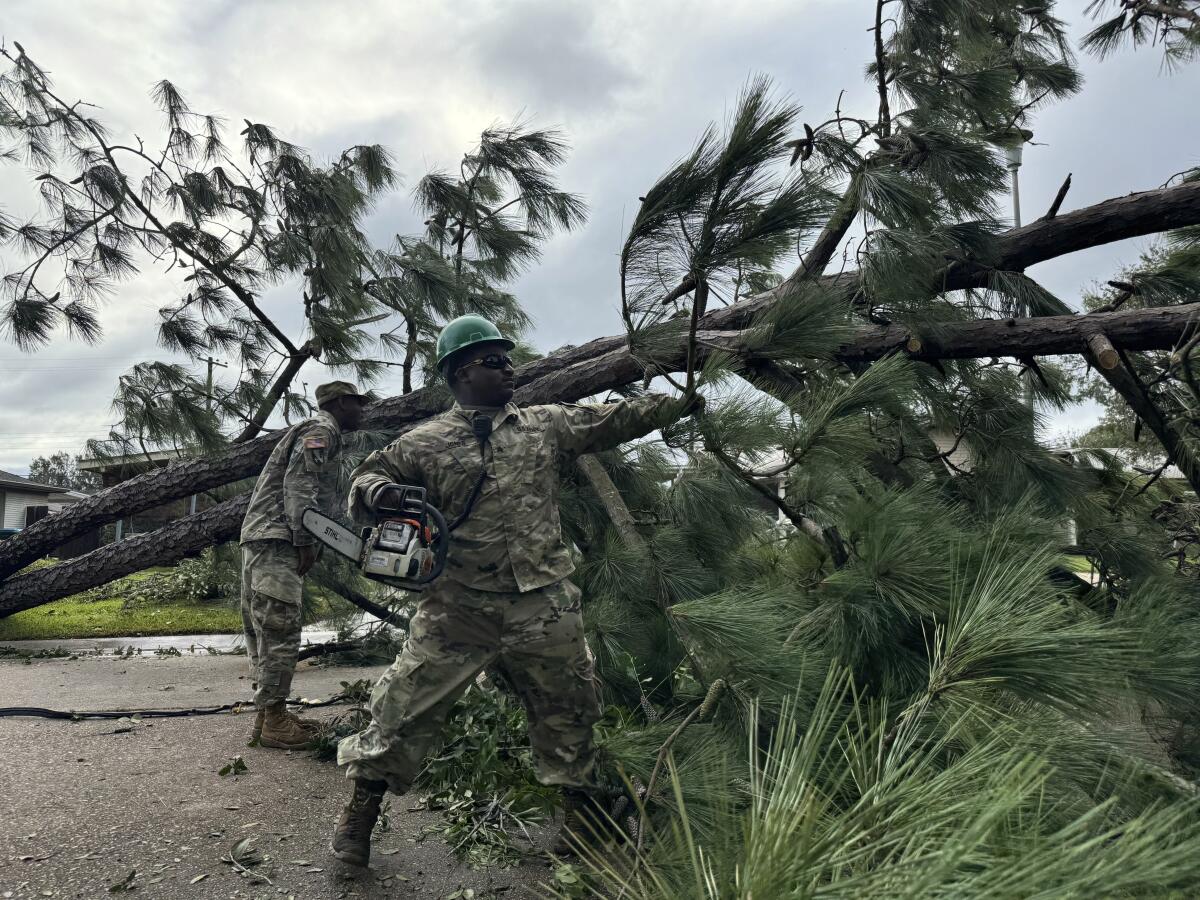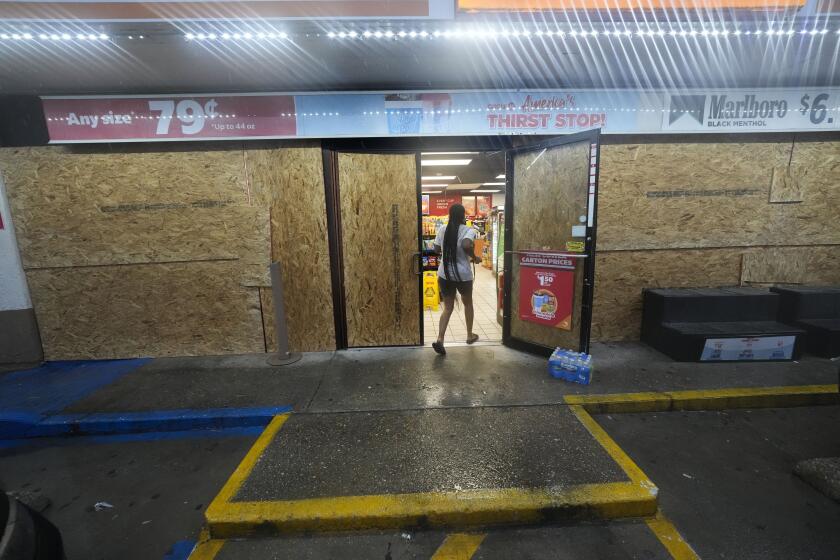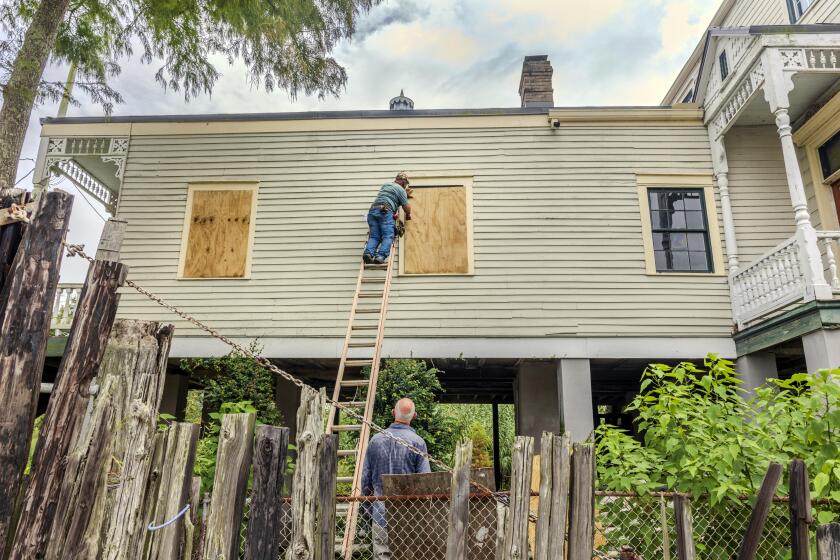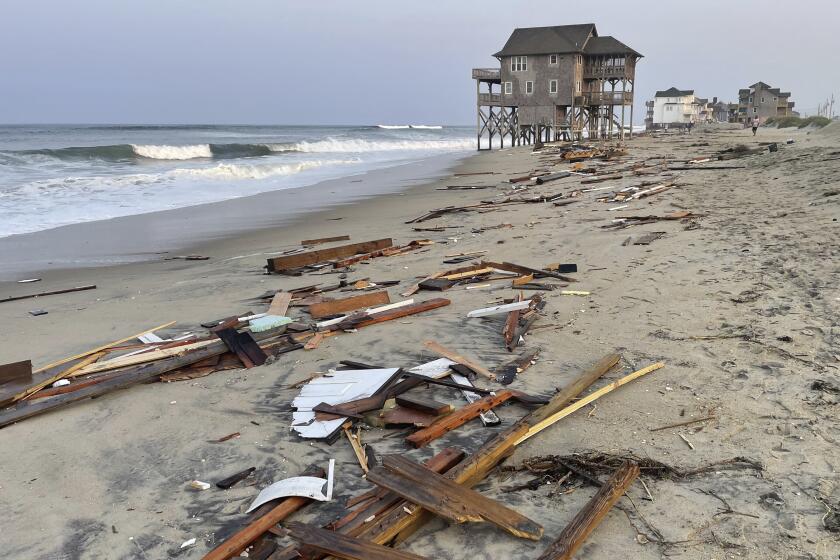Francine weakens and moves inland, leaving flooding and outages in Louisiana

- Share via
MORGAN CITY, La. — Francine weakened Thursday after striking Louisiana as a Category 2 hurricane that knocked out power to hundreds of thousands of homes and businesses, sent storm surge rushing into coastal communities and raised flooding fears in New Orleans and beyond.
As the system moved inland, emergency crews began clearing roads, utility workers started restoring electricity and neighbors helped pick up the pieces. There were no immediate reports of deaths or injuries, Gov. Jeff Landry said.
“The human spirit is defined by its resiliency, and resiliency is what defines Louisiana,” Landry said at a news conference. “Certainly there are times and situations that try us, but it is also when we in this state are at our very best.”
At the peak of the storm, 450,000 people in Louisiana were without power, the state Public Service Commission reported. Many of the outages were linked to falling debris, not structural damage. At one point, about 500 people were in emergency shelters, state officials said.
“The amount of money invested in resilience has really made a difference, from the power outages to the number of homes saved,” said Deanne Criswell, the administrator of the Federal Emergency Management Agency, who attended the governor’s news conference.
Hurricane Francine has made landfall in Louisiana as a Category 2 storm, with forecasts of a potentially deadly storm surge and flooding.
The storm drenched the northern Gulf Coast. Up to 6 inches of rain were possible in parts of Mississippi, Arkansas, Tennessee and Georgia, with up to 10 inches possible in areas of Alabama and Florida. Flash flooding threatened cities as far away as Jackson, Miss.; Birmingham, Ala.; Memphis, Tenn.; and Atlanta.
Francine slammed the Louisiana coast Wednesday evening with 100-mph winds in coastal Terrebonne Parish, battering a fragile coastal region that has not fully recovered from a series of devastating hurricanes in 2020 and 2021. The system then moved at a fast clip toward New Orleans, lashing the city with torrential rain. The city awoke to widespread power outages and debris-covered streets. Home generators roared outside some houses.
Rushing water nearly enveloped a pickup truck in a New Orleans underpass, trapping the driver inside. A 39-year-old emergency room nurse who lived nearby grabbed a hammer, waded into the waist-high water, smashed the window and pulled the driver out. It was all captured on live television by a WDSU news crew.
“It’s just second nature, I guess. Being a nurse, you just go in and get it done, right?” Miles Crawford told the Associated Press in a telephone interview Thursday. “I just had to get him out of there.”
He said the water was nearly up to the driver’s head and rising. Crawford told the man to move to the back of the truck’s cab, which gave him more room, and since the front end of the pickup was angled down, into deeper water.
“I wasn’t really questioning whether I should do it — it was just who is going to get it done,” he recalled, adding that he never caught the man’s name.
Tropical Storm Francine is churning in extremely warm waters in the Gulf of Mexico with increasing strength.
News footage from coastal communities showed waves from lakes, rivers and gulf waters thrashing seawalls. Water poured into city streets in blinding downpours. Oak and cypress trees leaned in the high winds, and some utility poles swayed.
By early Thursday, water was receding from flooded streets in Jefferson Parish, but canals were still high, parish President Cynthia Lee Sheng said in a social media post. Pumps that operated through the night could not keep up with the storm, causing drainage problems, she said.
She asked residents to give the parish time to clear the streets, noting that the hazards after a storm can sometimes be more dangerous than the storm itself.
As the sun rose in Morgan City, about 30 miles from where Francine made landfall, residents gathered tree branches that were strewn across their yards, where water rose almost to their doors. Pamela Miller, 54, stepped outside to survey the damage after a large tree fell on the roof of her home.
“It was a really loud noise, a jolt, and that’s when we realized the tree had come down,” she said. “Luckily it did not go through the roof.”
Jeffrey Beadle, 67, emerged from the hotel room where he sheltered for the night.
Beadle left his home Wednesday in a low-lying area about 10 miles outside town as the rain picked up. He lived there for 30 years without any major damage, but he was worried this time would be different because his home was right in the hurricane’s path. He loaded his car in preparation to check on his home.
The last time the Atlantic failed to produce any named storms between Aug. 13 and Sept. 3 was in 1968 — more than 50 years ago.
“There’s nobody over on that end I can call,” he said, explaining that he did not know what he would find. “Hope everything’s good.”
Sheriff’s deputies helped evacuate dozens of people, including many small children, who were trapped by rising water Wednesday evening in Thibodaux. Lafourche Parish Sheriff Craig Webre said deputies also rescued residents in the community of Kraemer.
The National Hurricane Center downgraded Francine from a tropical storm to a tropical depression with maximum sustained winds of 35 mph as it churned north-northeast over Mississippi. The system was expected to continue weakening and become a post-tropical cyclone later Thursday before slowing down and moving over central and northern Mississippi through early Friday.
The sixth named storm of the Atlantic hurricane season, Francine drew fuel from exceedingly warm Gulf of Mexico waters.
In addition to torrential rains, there was a lingering threat of spinoff tornadoes from the storm Thursday in Florida and Alabama.
In the Louisiana town of Ashland, 73-year-old Wilson Garner stood on the steps of a FEMA trailer he has lived in since his previous home was destroyed by Hurricane Ida in 2021. He has been trying for years to get enough money to fix up the old place. The $1,000 monthly rental stipend from FEMA is not enough for him to move, he said.
“You find a place for $1,000, man, you’re very lucky,” he said. “We just haven’t had no success. Where am I going to go? I don’t know.”
Brook and Cline write for the Associated Press and reported from Morgan City and Baton Rouge, La., respectively. AP writers Kevin McGill in New Orleans, Curt Anderson in St. Petersburg, Fla., and Russ Bynum in Savannah, Ga., contributed to this report.
More to Read
Sign up for Essential California
The most important California stories and recommendations in your inbox every morning.
You may occasionally receive promotional content from the Los Angeles Times.













